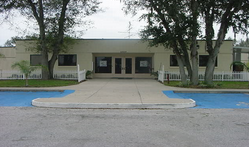
Florida Department of Juvenile Justice / http://www.djj.state.fl.us/
Pasco Juvenile Detention Center in San Antonio, Fl. is one of several state-run detention facilities that could be closed due to budget shortfalls.
Facing a budget shortfall to the tune of $54.5 million, Florida’s Department of Juvenile Justice (DJJ) may end up closing some detention centers to cover its losses.
Earlier this summer, the state DJJ was hit hard by a Court of Appeals ruling, which found that the department had overcharged counties. As a result, a large percentage of county-level juvenile justice costs were shifted towards the state, which now assumes an additional $35.5 million in costs. Making matters worse, new Medicaid guidelines, which denied matching grant money for DJJ-operated residential facilities, resulted in the DJJ losing $19 million in federal funding.
Earlier this month, Florida DJJ Secretary Wansley Walters sent a letter to Gov. Rick Scott, urging legislators for an earlier release of general revenue and to delay “implementation of non-critical contracts” as a means of offsetting some of the department’s deficits. Even so, the department would still require a loan from the state if payments from counties were lower than expected.
“Should the anticipated funding stream worsen, the department would request a temporary loan of moneys in accordance with Section 215.18, Florida Statutes,” the letter reads. “If the loan were not approved, the next option would necessitate closing detention centers.”

Florida Department of Juvenile Justice / http://www.djj.state.fl.us/
Brevard Juvenile Detention Facility in Cocoa, Fl., is one of several state-run detention facilities that could be closed due to budget shortfalls.
Detention centers in Brevard, Pasco and Okaloosa counties would be the first to be shuttered, Walters predicted, with closures following in Broward, St. Lucie and Volusia counties. As a result, nearly 250 employees could lose their jobs.
The DJJ is pursuing “every effort and funding mechanism” to prevent the closure of facilities, Walters wrote. Furthermore, she said reform measures in the state could be seriously jeopardized by the funding crisis.
“Please be assured the steps outlined herein are crafted in concert with DJJ’s reform efforts and the increased commitment the Legislature has demonstrated for prevention and diversion programs,” the letter reads. “However, I cannot minimize the potentially painful impact that these adjustments could have on our collective reform efforts in Florida’s juvenile justice system.”
The budget crisis has little impact on the state’s residential facilities, however, which are almost completely privately operated.
“It’s a really bifurcated system with pre-adjudication, i.e., the detention centers, 100 percent state-operated,” said David J. Utter, a director of policy for the Southern Poverty Law Center. “And post-adjudication residential centers, as of October 1, they’re going to be 100 percent privatized.”
Cathy Craig-Myers, executive director of the Florida Juvenile Justice Association, said the Court of Appeals judgment, in tandem with the Medicaid decision, constitutes a “perfect storm of bad timing” for the state DJJ.
“I think it’s very unfortunate that we’re at a point now where we pretty much depleted so much money out of the juvenile justice system,” she said. “The department, the agency is not really in a position to be able to deal with the shortfalls, and I’m just not sure how they’re going to proceed.”
In the six counties with facilities that may be closed, Myers said that the DJJ was likely eying smaller facilities whose populations could be absorbed by larger centers in neighboring counties.
“The secretary, for the last two years, has made a recommendation to close a lot of those detention centers if there was a budget shortfall,” she added. “So those that she mentioned, I believe are not big detention centers.”
Myers said she is more concerned about the implications on Medicaid than the state’s detention issues, however. “The youth that need mental health services, behavioral health services, the fact that they’re incarcerated in residential programs,” she said, “means they no longer have access to that funding.”